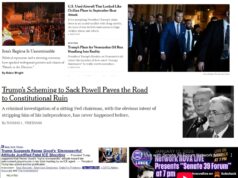The Republicans are getting away with their disgraceful strategy of blocking the whole constitutional process for filling a Supreme Court vacancy. All signs show that although roughly two-thirds of voters do not think this stonewalling is right, the issue is simply disappearing from view and thus is falling off the radar as an electoral factor.
Something should be done, and it can.
Two assumptions undergird my recommendation:
First, that there is a real chance that Donald Trump could be elected president. The political futures market says it’s about a 40% chance, which is far from nothing. And, while I believe the chances are lower than that, I also believe in the general finding that such markets are more accurate than the opinion of individuals. So, there is a genuine possibility that — unless something is done to break the present impasse — the Republicans could reap huge benefits from their scandalous conduct. Abuse of the Constitution should never be rewarded.
My second premise is that President Obama’s nominee – Merrick Garland – is quite acceptable as a Supreme Court justice. I know many on the left believe otherwise, but I think they are missing the essential reality in the situation. By that I mean that there is good reason to feel confident that Garland’s vote on the Court would be in line with the votes of the two justices appointed in the 90s by President Clinton and the two justices appointed by President Obama. To put it another way, I believe it would be a rare case in which the vote of a “centrist” Justice Garland would be different from that of a more solidly “progressive” justice.
Getting Garland onto the Court, in other words, would do the essential job — in purely political terms — of obtaining the first liberal-majority Court in over 40 years.
So even if the hopes of Hillary Clinton winning the presidency and the Democrats taking control of the Senate are fulfilled, that would not lead to a meaningfully better result for filling this vacancy.
If doing nothing means letting Garland’s nomination die from neglect, then doing something is preferable. Because doing nothing means substantial risk for little gain.
Fortunately, there’s something that can be done.
I propose that the president proceed with a modified version of an idea that was floated over a month ago, by an attorney named Gregory L. Diskant, in a Washington Post op/ed. The president can use this idea to bring in the judicial branch to break the impasse between the executive and legislative branches.
Diskant’s essential idea is that the president can declare that the Senate, “having been given a reasonable opportunity to provide advice and consent to the president with respect to the nomination of Garland, and having failed to do so, can fairly be deemed to have waived its right.” (Emphasis added)
And with the Senate having “waived its right,” the President – who the Constitution says “shall appoint” – can just proceed to make the appointment on his own.
When that op/ed by Diskant came out, I wrote favorably about it.
Developments since then lead me to wish now to make slight modifications in the approach Diskant laid out. Over the past month, it has become ever clearer that the Democrats are failing to punish the Republicans effectively for their shameful power grab.
• The President has shown himself again incapable of inspiring moral outrage in the American people. Or rather, he doesn’t really even try.
• With nothing happening, a journalists like Slate.com’s legal expert, Dahlia Lithwick, is expressing frustration about their inability to find ways of calling voters’ attention to the issue.
(Lithwick writes: “Because there is virtually nothing happening each day, there is virtually nothing to write about each day. And because we don’t write about it each day, voters continue not to know that it is going on each day. And since so many Americans don’t know about what isn’t happening to the empty seat at the Supreme Court each day, that all adds inexorably to the vague general impression that they must not care about it. And since they don’t seem to care about it, it hardly makes sense to write about it.”)
• And evidence has suggested that there is more passion on the Republican side in support of the Republican stonewalling than there is on the Democratic side for defending the established American constitutional tradition for dealing with nominations to the Supreme Court.
All of which means that, not only is it looking like the Republicans have a 40% chance of getting their desired scenario of re-establishing their control over the Court for the next generation. But also it looks like they can execute this ploy without the Democrats inflicting on the Republicans, in the coming elections, the devastating punishment these power-grabbers so richly deserve.
For such reasons, I would now advocate streamlining Diskant’s strategy and handing the issue off to the Supreme Court to decide: is the Senate stonewalling legitimate, or has the Senate, by its refusal to play its role, “waived” its right to “advise and consent”? The Court can then break the tie between the other two branches.
Diskant suggested that the President issue a 90-day warning to the Senate Republicans: if the Senate does not act within that period, the president will declare the Senate to have waived its right and proceed on his own to appoint Garland. I would propose that the president give the Senate a mere two or three weeks. “If you have not launched the appropriate and traditional process by then…”
I would also propose that, rather than just waiting for the Republicans in the Senate to take him to Court, the President be quite explicit that the conduct of the Senate needs to be judged by the Supreme Court. He should make the case that what the Republicans have done is
• An unjustifiable abdication of their constitutional responsibilities;
• A dangerous precedent, degrading our constitutional system, that cannot be allowed to stand; and therefore
• A matter on which the Supreme Court, as guardians of our Constitution, should weigh in.
It seems possible that the Supremes will refuse to hear the case. (Lithwick notes that Chief Justice Roberts “has opted to stay above the fray.”)
(But arguably the Supreme Court has as much reason to adjudicate this battle between the branches as it did in another very sensitive case involving competing claims between different parts of the government. In the case of United States v. Nixon, regarding President Nixon’s assertion of “executive privilege” during the Watergate saga, a unanimous Court decided that the president could not withhold evidence important for ongoing Watergate investigations and prosecutions.)
But even if the Court refuses to hear the case, even if the Court were to tie 4-4 in trying to decide the case, and even if the Court decided against the President’s unilateral appointment—it would be a plus for the President, and for the liberal cause generally.
For what is working for the Republicans is the lack of public attention to the issue, as the weeks and months roll by. With this move, with an appeal of the issue to the Supreme Court as to whether across-the-board stonewalling is a legitimate fulfillment of “advise and consent,” it will again become a big story. And the media will eagerly cover it. The media like battles, and a battle between the two elected branches is a big story.
Which means that once again the voters will look at what the Republicans are doing, and will hear the powerful arguments that can be made in condemnation of it, and will be reminded of their widespread opinion: this is not right.
The Constitution is being abused. Attention must be paid.




![Sunday News: “Trump Is Briefed on Options for Striking Iran as Protests Continue”; “Trump and Vance Are Fanning the Flames. Again”; “Shooting death of [Renee Good] matters to all of us”; “Fascism or freedom? The choice is yours”](https://bluevirginia.us/wp-content/uploads/2026/01/montage011126-238x178.jpg)






